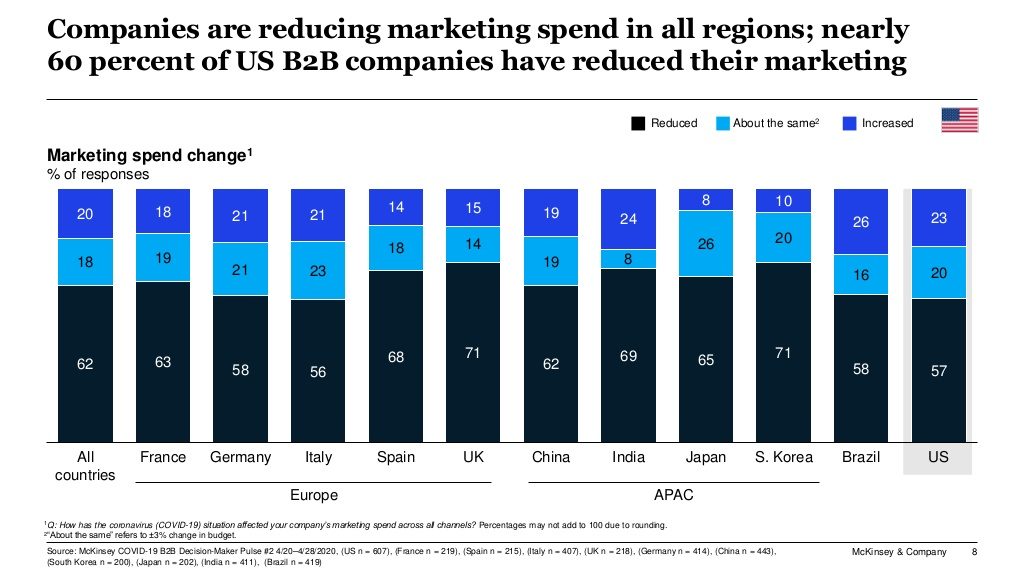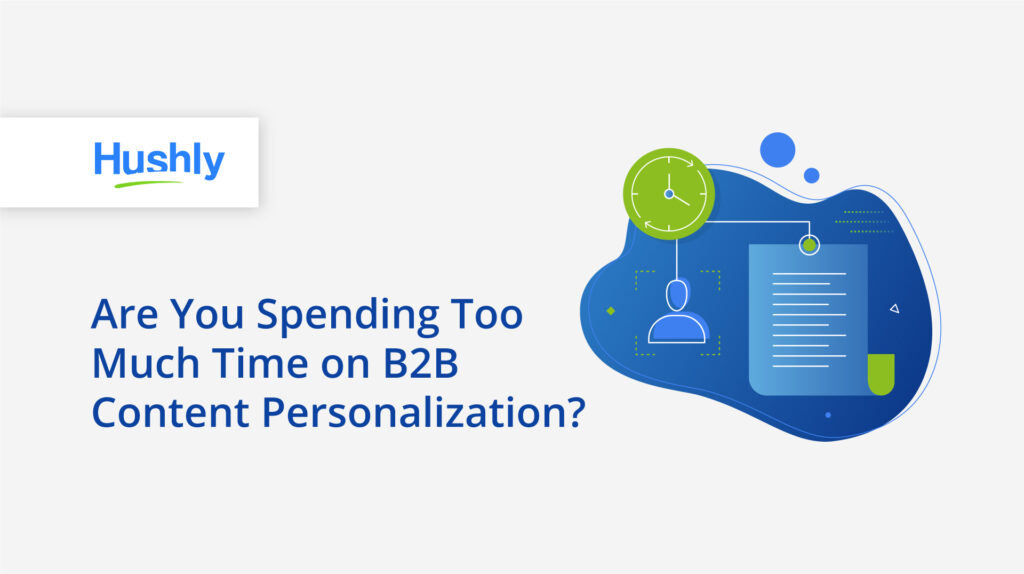Filters
Content Type
Topic
B2B Marketing Budgets During COVID-19: Why You Don’t Need to Worry

Some states might be slowly creeping back to normal, but the reality of business and life is far from how it once was.
The truth is people are scared.
Scared for their jobs, the roof over their heads, food on their tables, and even their physical and mental health.
As if the virus itself didn’t give people enough to worry about, the also economy reached unprecedented lows.
You’re no doubt wondering about the future of B2B right now. How will B2B marketing budgets change? Will events ever resume? How can we overcome this together?
Let’s look at some of the possibilities.

How Has COVID-19 Changed B2B Marketing Budgets?
In late March, Aggregage and Webbiquity released the results of a study on B2B marketing budgets of some 450 companies.
B2Bs weighed in on how the pandemic affected their marketing strategies and how they intended to adjust their budgets. 72% of B2Bs said they either planned to increase, maintain, or slightly decrease their marketing budgets. What does “slightly decrease” mean? 20% or less.
That’s good news because some B2Bs say they even planned to spend more on marketing!
In other words, budgets would more or less stay the same.
The real changes seemed to impact B2B events. Anyone who’s worked in B2B for any amount of time knows events are a major fixture in marketing. They’re huge for networking, promoting, and brand recognition.
Most business leadership – 84% – say in-person B2B events are a key component of their visibility and overall business success.
The survey showed that 70% of B2Bs planned to cancel events for at least 60 days (as of March) while a quarter would hold off on in-person gatherings for at least six months. That’s a major blow if you rely on events for visibility.
A month later, at the end of April, McKinsey & Company conducted a similar study on B2B marketing budgets of over 3,700 companies across 11 countries.
At this point, 62% of these global B2Bs had reduced their marketing budgets. American companies didn’t scale back quite as much: Only 57% had decreased their budgets.

While the economic effects of COVID-19 are far from over, we do have a clearer impact today than we did in March.
How Does B2B Stack Up Against B2C?
It’s easy to look at these figures and panic, but the truth is B2B is showing better resiliency than B2C during the pandemic.
While both B2B and B2C have suffered a 69% slump in demand for their products and services, B2C marketers are much more vulnerable to redundancy.
Marketing Week and Econsultancy conducted a study across 1,900 global marketers. Only 5% of B2B marketers said their job status had suffered compared to 7% in B2C.
Those numbers are already pretty small so let’s take a closer look.
Of that 5% for B2B, a quarter said their jobs were now redundant while 64% had their roles scaled back. 11% of them said their roles had expanded due to the pandemic.
Of the 7% in B2C, nearly twice as many marketers said their roles were now redundant: 44%.
Consumer companies as a whole are taking a step back before launching marketing campaigns right now with 89% saying campaigns are under review or on hold.
Squeezing the Most Out of Your B2B Marketing Budget
If you’re shifting or reducing your B2B marketing budget in the wake of COVID-19, you can take a few steps to stretch every dollar as far as possible.
Focus on Smaller Localized Events
Massive events at huge venues are out of the picture for the time being. Even if they lift social distancing measures tomorrow, that doesn’t mean people will feel comfortable jumping on a plane for a marketing event.
Instead, focus on networking and building within your own community. Host local events on relevant topics with organizations you may normally not connect with.
Boost Your Account-Based Marketing Strategy
Now is a great time to focus on those key accounts that truly matter.
Boost your marketing to support loyal accounts and reach out to new ones. Keep an eye on different market fluctuations to see if you should scale back marketing for certain companies and move towards another.
Everyone likes to feel appreciated. Let current accounts know you value their business with gifts, email campaigns, freebies, and discounts if you can.
Hone Your Branding
Organizations may have scaled back their B2B marketing budget for now but things could change any moment. Eventually, most companies will jump back into action.
Focus on your brand awareness and messaging. Create informative, valuable, and relevant pieces of content to connect with your audience. Just make sure to avoid presenting yourself as an opportunist: look for ways to help, not exploit.
Drive ROI from Your B2B Marketing Budget with the Power of AI
If you’re scaling back your B2B marketing budget, it may be smart to look towards artificial intelligence. AI is more accessible than ever and it can help you stretch every dollar as far as possible.
With AI-driven tools, every visitor to your website gets a completely hyper-personalized experience – whether they’re a known lead or anonymous visitor. Just like Netflix, an AI engine uses behavioral data and third-party intent data to learn about your visitors and offer personalized content recommendations.
AI and machine learning are perfect for boosting visibility, earning trust, and nurturing leads. Remember that B2Bs spend nearly half of the buyer journey researching independently. They spend only 17% of their time reaching out to potential suppliers.
Your website is your best asset for educating leads about your company and how you can help them. Tools like adaptive content hubs and self-nurturing landing pages allow your leads to research at their own pace without the burden of filling out a form or committing to a phone call with your sales team.
The Hushly AI engine with machine learning offers the technology you need to create a completely unique experience for every visitor to your site during every session. See Hushly’s AI engine in action now!

The post B2B Marketing Budgets During COVID-19: Why You Don’t Need to Worry appeared first on Hushly.


